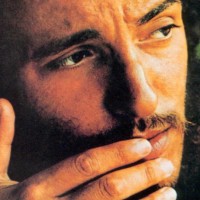Confession time: When Bruce Springsteen issued The River in October of 1980, I didn’t like it very much. It’s an unusual reaction for me (there’s one other exception) as Bruce’s material nearly always manages to resonate in one way or another.
I dunno, maybe I was expecting Darkness Part II, with more loud guitars and searing solos. More likely is that this young music fan was just not ready to embrace the wide range of styles Bruce Springsteen offered up on the album.
As the years went by, The River grew to be one of my favorites. It’s populated with some of Bruce’s saddest and happiest songs. Recorded with the E Street Band gathered in a single room, The River is also one of his liveliest recordings.
Now, when I hear those clanging guitar chords that open “The Ties That Bind” (as I did on Song #2 of the initial Hartford show on the Magic tour), I’m ready to take in all of that music that I had such a hard time getting my arms around. From the jangling guitar arpeggios, to the hard snap of Max Weinberg’s drums to Clarence Clemons’ enthusiastic solo, this song gives just a hint of what’s to follow.
“THE RIVER”: Like a great poem, a great song can take a series of connected ideas, perhaps as complex as a life, and distill it to its essence. With the title track from Bruce Springsteen’s The River, we have lives that were full of dreams, interrupted by the realities of life. The turning point occurs early on with “Then I got Mary Pregnant/and man that was all she wrote.” Wistful looks back don’t provide a lot of relief to what follows.
The sadness that “The River” is built on is emphasized by that forlorn harmonica line that introduces the song. It’s just that kind of juxtaposition that makes the tune so great: a short, beautiful piece of music that infuses such a melancholy story.
“HUNGRY HEART”: Well, here’s one that didn’t get away. Bruce Springsteen had originally written “Hungry Heart” for the Ramones, but Jon Landau thought it was a keeper. Great advice there as the song was a huge hit.
Now, there are some folks in the fan base who can do without this song. Maybe it’s been overplayed. Maybe it’s worn out its welcome. Nah! Here’s the thing: there are some fans out there who just can’t stand happy Springsteen tunes. This one indeed has that classic E-Street sound, with the chiming glockenspiel and Clarence Clemons honking away at the bottom end. It’s pure joy, which seems to be an emotion lost on some people.
And as much as I try to never impart my “singing” on the world, at a show I will gladly sing along with the first chorus of “Hungry Heart.” Every time.
“THE PRICE YOU PAY”: “Why does Bruce neglect this song?” The sentiment has been expressed many, many times on various E Street messages boards over the years. And why doesn’t he play it? Who knows?! For as much as we think we might understand or “know” Bruce Springsteen through his songs and actions, his motivations remain something of a mystery. The man has entire albums he ignores — the oft-sited Tunnel of Love as well as the more recent Magic — leaving the fan base with little more than speculation as to his setlist rationale.
With the harmonica that accents the chorus and the biblical references in the song’s final verses, I’ve always thought of this as a companion piece to “The Promised Land.” Its theme of tossing caution aside and driving toward a dream (and dealing with the consequences of your actions) would fit in perfectly with this or any Springsteen tour.
And then there was this one special night in Philly…
“POINT BLANK”: I don’t often use the word “haunting” but dammit, I think I feel it coming on. Here we have a tale, like many on The River, of a troubled life, one that may not even have had much promise to start with. With darkly lit piano tones and reverb-laden guitar echoes encircling the unfolding story, you’re just certain that the conclusion of “Point Blank” can’t be a happy one.
But “haunting”? First, there’s a musical fragment at the end of the second chorus: “You’re walkin’ in the sights, girl of point blank/and it’s one false move and baby the lights go out” — and with that Danny Federici lets go with a short but pointed keyboard solo that underscores the desperation. The second comes with the fantasy (our man dreams of a return to his love) vs. the reality. He sees her on the street, but she just shrinks back into the ruins of her life. He feels for her and laments at the fact that she’s given up hope. It’s tough stuff. Always gets to me.
“WRECK ON THE HIGHWAY”: Mortality and the very, very thin line between life and death, those ideas quietly rumble just beneath the surface on most of The River‘s more serious tracks. “Wreck On The Highway” brings that all into focus, with a man realizing just how fragile life can be.
Looking back, this song feels like a bridge over to Nebraska. Of course, back in 1980, we had absolutely no idea of the turn Bruce Springsteen’s music was about to take. I sure didn’t.
- How Eric Clapton’s ‘Me and Mr. Johnson’ Made the Case for British Blues - March 20, 2024
- Why Todd Rundgren’s ‘Back to the Bars’ Remains So Powerful - December 13, 2023
- Reevaluating Bruce Springsteen’s ‘The Wild, the Innocent and the E Street Shuffle’ - September 11, 2023



